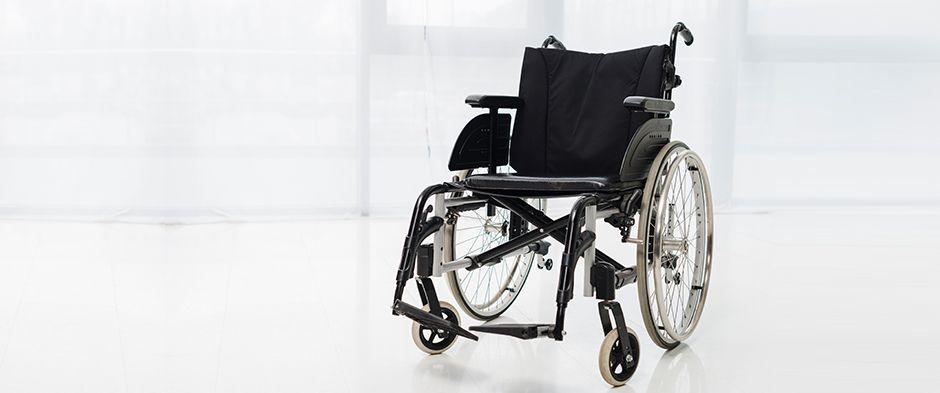
Essential Aids' Guide to Manual Wheelchairs
Sally Madeley-Carr, OT06 Mar 2020
For people who believe they may need a wheelchair for essential medical reasons, the first step is to talk to a GP. They will help you access a full seating assessment from an occupational therapist or physiotherapist who specialises in the field.
If you're not in this position but feel a wheelchair would help you in various situations, there are still factors you need to think about before choosing one. There are also important accessories to consider, like wheelchair cushions and wheelchair ramps.
Self-propelled or attendant-propelled wheelchair?
One of the first questions to answer is whether you need someone to push you, or whether you can propel a wheelchair without help. Self-propelled versions require significant body strength through the core, shoulders, arms and hands.
Most chairs of this kind have two rims, with the second designed for contact with the user's hands as they push.
Attendant-propelled wheelchairs are pushed from behind by a second person. These models typically don't have the oversized rear wheels. It's worth remembering that the person doing the pushing must be strong enough to control the chair and negotiate any obstacles.
Propelling a wheelchair yourself
As mentioned, the standard method of propelling a wheelchair is via two large rear wheels, which have two rims. One mounts the tyres in the conventional way, while a second outside rim is used to grip and push. Most people like to use padded gloves to make this easier on the hands, especially if they're using the chair outside.
There are, however, wheelchairs with alternative designs which allow a different method of propulsion.
Lever-drive wheelchairs require the user to pump back and forth a front mounted lever. This in turn drives the wheels. To steer this type of chair, the user turns to change the direction of the same lever.
If the person has the use of both hands and arms, a variation of the lever-drive system is available which features two levers. This 'duel lever' system requires alternate pushing and pulling of the levers.
A 'double hand rim' also allows someone with use of just one hand or arm to self-propel a wheelchair. Here both propelling rims are engineered on one side, with a 'scissor' mechanism linking one of the rims to the furthest wheel.
The user pushes both rims simultaneously in order to travel in a straight line. To make a turn, the user must pull or push one of the rims accordingly. This process requires both strength, stamina, dexterity and practice!
Pedal attachments allow you to propel a wheelchair using your feet. The mechanism here deploys handlebards, with the feet turning a crank similar to a bicycle.
Picking the right size
It's vitally important that you don't use a wheelchair which is the wrong size for your body. It should transport you in comfort and not restrict your movement when you're in it.
Ideally it should not compromise your posture and retain alignment for your spine, neck, head, knees, pelvis and hips. It should also avoid creating points of friction which might lead to pain or pressure sores. It's important to make sure the seat is adequately deep and wide so that you can sit in comfort with space either side of your thighs and posterior.
Seat width
When buying a wheelchair, most models will be available in various seat widths. If you have any doubt as to the correct one for you, make sure you discuss it with a medical professional before going ahead. This is especially true if you have a high bodyweight, have lost a limb or you have another specific physical impairment.
Make sure that the chair does not fit tightly around you. You need enough space to move within the seat, so you should be able to rotate your upper body if required.
If you're buying a wheelchair online, you need to measure various dimensions of your body. Sit in a chair with your feet flat on the ground with your hips at a 90 degree angle to your torso.
To establish which seat width (remember this is distinct from the overall width of the wheelchair) you require, measure the widest point of your upper legs, whether this be your thighs or hips. To choose the correct seat width, you then need to add on 1cm to 2cm either side.
You should also take into account the seat depth. It should be approximately the distance from the back of your knee to your coccyx, minus 2 or 3cm. It's important that the seat depth is not too excessive, or it might cut into the back of your legs.
Cushions
Wheelchair cushions of various styles and sizes are available to help with comfort. Essential Aids supplies and extensive range range, available in dimensions to fit all commonly found wheelchair seats.
The materials used in wheelchair cushions varies greatly, with foam-filled, gel-filled and inflatable versions all available.
Armrests
When you're sitting in a wheelchair, it's desirable to retain a good posture and the correct height of armrests can help you do so. You shouldn't be slumped to one side or leaning too far forward. The armrests offer support on either side of the body. Ideally the height of the armrests should be set to allow your elbows to bend at around a 90 degree angle.
Footrests
To keep your feet supported, wheelchairs are usually fitted with foot-plates. These can be extended to the desired length, allowing you to find a comfortable position for your feet and legs. In most cases, footrests swing or fold out of the way when not in use. Heel straps or guards prevent your feet slipping backwards when they are resting on the plates.
If you have complex seating needs or very long legs, you will need to talk to a professional who has first-hand knowledge of your circumstances.
Backrest
The backrest width of the wheelchairs is usually the same width as the seat. If your back is actually wider than your hips or thighs, you should consider buying a larger chair. It is imperative that you are not squashed into the chair when you sit in it.
Again, it is wise to consult an occupational therapist if you have any doubts about sizing.
Total chair width
If you intend to use the wheelchair around the house, it's obviously important to consider doorway widths or any obstacles which might impede you. Remember that the turning the chair requires a certain arc, so take this into account when you're measuring.
Individual differences
In terms of an individual's suitability for either a self-propelled or attendant-propelled chair, there are several factors involved. Here we'll run down the most relevant:
Mobility
'Mobility' refers to someone's general capacity for bodily movement. This can include their ability to move from A to B, to get up or sit down and their general physical dexterity.
Balance
Your capacity for remaining steady when seated or standing or when moving from one to the other.
Posture
The ability to hold your body in position when either standing or sitting. For wheelchair use, consider if you can remain sitting upright without the support of cushions.
Tolerance
This relates to the time you can spend comfortably sitting, standing or walking.
Cognitive ability, perception and eyesight
If someone has diminished capability in any of these areas, they may not be suitable for a self-propelled chair.
Other physical attributes
If you are severely overweight or unusually tall, a standard wheelchair may not work for you. It is important that any wheelchair you use if both large enough and offers support for your whole body.
If your skin is damaged or fragile, this may also play a part as you may be susceptible to developing sores.
An occupational therapist would need to undertake a thorough assessment if there are question marks over any of these areas.
Aluminium or steel
For a number of years aluminium has been seen as the material of choice for wheelchair frames. It is lightweight, non corrosive and offers the required rigidity. Steel is also used, but is heavy and prone to rust. Steel wheelchairs do tend to be slightly cheaper than aluminium and are still used as first choice for bariatric chairs which need to be stronger.
Folding or non-folding wheelchairs
The vast majority of wheelchairs collapse down for easy transportation or storage. If you think it might be tight for the boot of your car or any storage location you have in mind, make sure you assess the chair's dimensions when it's in its collapsed state.
Tyres
There are two types of wheelchair tyres available - pneumatic and solid. They play a part in manoeuvrability and ride comfort.
Pneumatic tyres - which require inflation - offer a more comfortable ride, with the air inside cushioning impacts. They are however liable to puncture if they contact sharp objects, making maintenance costs generally higher.
A more popular option for most modern wheelchairs are solid PU wheelchair tyres. Generally made from a plastic compound or rubber, they're not vulnerable to punctures but do not absorb bumps in the road surface quite as well as inflatable tyres.
While they do increase the overall weight of the chair, they involve lower maintenance costs and much greater reliability.
Wheelchair ramps
Whether it's improving access around the home to climb low steps or to cater for raised door thresholds, wheelchair ramps are important pieces of equipment. Essential Aids supplies a wide range of high quality ramps.
Some are of fixed length and designed to stay in place, while others fold down, are lightweight and portable, so they can easily be transported with your wheelchair in the boot of a car.
Modern wheelchair ramps are usually made of aluminium, keeping their weight to a minimum.

Sally Madeley-Carr, OT
Sally qualified as an Occupational Therapist in 1996 and is a well-respected professional in the field of rehabilitation equipment and living aids. She has worked in private practice and within the NHS, developing a broad experience with adults and children. Click here for Sally's registration with the Health and Care Professions Council. The HCPC regulates health, psychological and social work professionals in the UK.